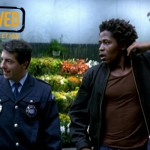
Review: Beyond the Hills (2012)
Cast: Cosmina Stratin, Cristina Flutur, Valeriu Andriuta
Director: Cristian Mungiu
Country: Romania | France | Belgium
Genre: Drama
Official Trailer: Here
Editor’s Note: Beyond the Hills opens in limited release tomorrow, March 8th
The overwhelming majority of reviews have postulated Beyond the Hills as Cristian Mungiu’s “belated follow-up to 4 Months, 3 Weeks and 2 Days”, the difficult 2007 Communist-era abortion drama which won him a Palme d’Or and, combined with the success of Cristi Puiu’s The Death of Mr. Lazarescu two years prior, launched Romanian cinema into the spotlight of critical attention. Valuable as the connection between Mungiu’s films is to consider—both focusing on a pair of female protagonists whose lives are oppressively dictated by patriarchal societies—most have opted to simply ignore Tales from the Golden Age, the blackly comic 2009 omnibus which lampooned the absurdity of the Ceaușescu regime. Of course, Mungiu directed only one of the film’s five segments, but the script bears his name alone, and to disregard its pivotal importance to his maturation as a filmmaker would be to discount a good portion of Beyond the Hills’ significance.
Driven by the naturalism of his characters and pacing both, Mungiu allows the story to unfold in primarily single-shot scenes, the camera simply observing for minutes at a time as conversations slowly reveal the nature of this microcosmic society, and awkward glances between them suggest the storied history of these young women.
 Prolonged preamble though this all may seem, it’s important to emphasise Tales from the Golden Age, not just because it refutes the idea that Beyond the Hills is a direct follow-up to 4 Months, but rather because—much like Pablo Larraín with No—it stands as a transformative work for its director, a point of change which allows him to overcome the thematic preoccupation of the past and bring his scathing socio-political critique forward to the present. Where 4 Months was an inherently angry film—furious, even, in the way its seething rage spilt forth from the bleak circumstances of its all-but-abandoned heroines—Tales from the Golden Age saw Mungiu learn to comically come to terms with the past, to find levity in the scars of history, and, most importantly of all, to move on.
Prolonged preamble though this all may seem, it’s important to emphasise Tales from the Golden Age, not just because it refutes the idea that Beyond the Hills is a direct follow-up to 4 Months, but rather because—much like Pablo Larraín with No—it stands as a transformative work for its director, a point of change which allows him to overcome the thematic preoccupation of the past and bring his scathing socio-political critique forward to the present. Where 4 Months was an inherently angry film—furious, even, in the way its seething rage spilt forth from the bleak circumstances of its all-but-abandoned heroines—Tales from the Golden Age saw Mungiu learn to comically come to terms with the past, to find levity in the scars of history, and, most importantly of all, to move on.
He moves on, like Corneliu Porumboiu—who progressed from 12:08 East of Bucharest to Police, Adjective—and Radu Muntean—who followed The Paper Will Be Blue with Tuesday, After Christmas—to the issues now facing Romania, the raw anger of 4 Weeks not assuaged by his comic interlude but rather focused, channelled toward new and more pressing topics. Beyond the Hills finds in the dominant Romanian Orthodox Church much the same oppressiveness as was seen in the Communist party of those earlier films. Debut actresses Cosmina Stratan and Cristina Flutur portray Voichita and Alina, respectively a nun and the childhood friend she and her order attempt to indoctrinate to a frugal life at their rural convent. Driven by the naturalism of his characters and pacing both, Mungiu allows the story to unfold in primarily single-shot scenes, the camera simply observing for minutes at a time as conversations slowly reveal the nature of this microcosmic society, and awkward glances between them suggest the storied history of these young women.
Harbouring the layered intensity his immersive narrative construction breeds, Mungiu shapes this fraught relationship as both an affectingly believable confluence of genuine characters and a targeted critique of the latent harmfulness of dogmatic faith.
 Mungiu’s approach—sequential shooting accompanied his extended takes—places a heavy emphasis on performance, a dangerous risk given the inexperience of the leads, but one which pays an immense dividend. Theirs is a loaded relationship, their mutual upbringing in an orphanage accentuating the difference of their paths as opposite sides of the same coin: where Alina fled to Germany, Voichita fled to Christ. What’s remarkable about the performances is the manner in which they employ body language and vocal intonation to communicate the insincerity of the dialogue, each woman ostensibly respecting the views of the other while firmly disapproving in all else but words. Harbouring the layered intensity his immersive narrative construction breeds, Mungiu shapes this fraught relationship as both an affectingly believable confluence of genuine characters and a targeted critique of the latent harmfulness of dogmatic faith.
Mungiu’s approach—sequential shooting accompanied his extended takes—places a heavy emphasis on performance, a dangerous risk given the inexperience of the leads, but one which pays an immense dividend. Theirs is a loaded relationship, their mutual upbringing in an orphanage accentuating the difference of their paths as opposite sides of the same coin: where Alina fled to Germany, Voichita fled to Christ. What’s remarkable about the performances is the manner in which they employ body language and vocal intonation to communicate the insincerity of the dialogue, each woman ostensibly respecting the views of the other while firmly disapproving in all else but words. Harbouring the layered intensity his immersive narrative construction breeds, Mungiu shapes this fraught relationship as both an affectingly believable confluence of genuine characters and a targeted critique of the latent harmfulness of dogmatic faith.
If Alina and Voichita constitute the emotional centre of Beyond the Hills, it’s to the character of the priest that Mungiu consigns the weight of his underlying social commentary. A sombre sort in his early 30s, he presides over the convent as the sole male resident, duly referred to by each of the nuns as “Daddy” with a sinister pseudo-sexuality to make Freud weak at the knees. He and all he represents cast a dark shadow over every scene of the film, its characters’ every action tailored to his demands, its dialogical exchanges—the masculine pronouns which dominate religious language abound—rife with the influence of this patriarchal figure. That he himself is never demonised, then, is paramount to the film’s view of religion; it is not the rigidity of the faith which offends, but its very foundations, the inherent exclusivity and entitlement at its core.
Related Posts
![]()
Ronan Doyle
![]()
Latest posts by Ronan Doyle (see all)
-
http://www.facebook.com/people/Chris-D-Misch/28134555 Chris D. Misch
































